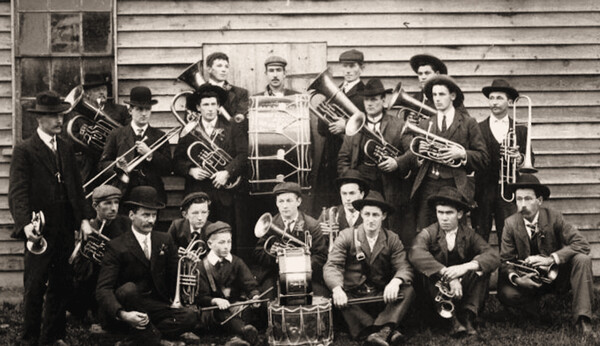News & Articles
Browse all content by date.

Editor’s note: How about a little mirth for a change?
With the spring-like weather of late, the Camp Shack Marching Band has been busy parading up and down the snowy trails and portages in preparation for another busy season, which culminates in near mythical performances during the annual deer hunting opener.
That’s when the 100-plus piece band pays its annual visit to every hunter in a deer stand within a 50-mile radius of Camp Shack , a tradition that many, but not most, hunters seem to enjoy on those cold and lonely mornings deep in the woods.
In best altruistic orchestral fashion, the band simply tries to put a little joy in the hearts of hunters who sit alone with their thoughts, blaring stirring renditions of Dead Man’s March and Rum Boy Blues at decibels reaching astounding levels.
It might be noted that the band never misses the annual fishing opener, now only a couple months away, arriving early at many a boat landing in the steam-powered mobile orchestra pit to welcome another fishing season. But fishermen aren’t quite as captive an audience as are deer hunters stuck in their trees, and they often cover their ears and race off in boats before the trombones can grease an elbow.
“We can’t worry ourselves over their interest in music,” conductor Silt Pillage has said many times. “We all hope music will sooth the savage soul, and the band is just itching to play early in the season.”
An attempt to serenade fishermen by loading the band on a flotilla of pontoon boats one year spelled disaster. Without proper room to march and form the band into the shape of a walleye, the armada drifted aimlessly across the border country for weeks before setting foot again on dry land. The disconsolate ensemble finally broke from their musical funk just in time for the first summer celebration in Toimi by taking their usual spot behind the Babbitt Bituminous Band and getting the buoyancy back in their step.
“I guess every savage soul can’t be soothed,” Pilt finally admitted.
That was then, this is now.
While they don’t exactly hibernate, the band did come out of winter in a bit of a groggy state after emerging from their dens and shacks scattered across the edges of the canoe country.
The flugelhorns and tubas, of course, were the last to rub the sleep out of their eyes and fall in line for the first days of practice under the blazing early March sun.
It might be noted that a slight tuba insurrection has been brewing in the band over the past few seasons, so listeners may note a hint of discord in the ranks. A professional melodic mediator has been attempting to work through the dilemma, with the main grievance centering around the request that more tuba solos be allowed and sanctioned during performances.
All parties have agreed that violence will be avoided if possible.
The conductor has been asked to step aside temporarily as the issue awaits a resolution. Pillage felt his power over the band slipping and he had taken to waving a large knife overhead as he led the band through their paces. He had never been favorable to the tubas, that much was known, restricting their influence in the band during the past several seasons.
The tubas had been relegated to minor duties with the band, at one point finding themselves answering telephones in the offices at Camp Shack and fielding grievances from irate customers who had financial interests and holdings in the Camp Shack Mortgage and Indemnity Co.
“I’m a tuba player, not a financial manager, not a crook,” pleaded one musician.
Through all the trouble the Exalted Shack Master has kept a positive profile, still assigning personal bartenders to all visitors that arrive at Camp Shack .
“There’s no moral turpitude to this mess,” he said with a sigh during a recent cocktail hour with the many shareholders of the shack. “Tolerance and patience will see us through, as always.”
And the band will play on.
| Tweet |


